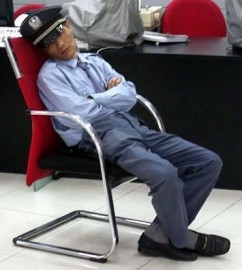
This blog has commented in the past on the impact of sleep and tiredness on political decision-making, and it is interesting to see the same phenomenon arise elsewhere.
The practice of the EU of taking its most important decisions at intergovernmental summits is prone to error and making mistakes. We are supposed to admire the heroism of our national leaders, as they sit up all night haggling over details. In fact, we should be horrified by what they do. There are long stories of problems being created because proposals are thrown together at the last minute rather than being considered properly in a rational and ordered way. This even extends as far as the European treaties themselves, where mistakes have been written in to the text because the officials and negotiators were nodding off.
A new book by Richard N Haass, “War of Necessity, War of Choice”, on the two Bush wars against Iraq observes the same conduct. Richard Haass was an official for both George Bushes (senior and junior) and reports on the approach to war. Gideon Rachman’s review in the Financial Times comments:
“Mr Haass is also skilled at recreating the agenda and atmosphere of crucial meetings where Iraq policy was formed. He gets across the point that the decision-makers involved in foreign policy crises are usually operating at the very edge of exhaustion. His view is that there is nothing to be done about this. An outsider might wonder: after all, if people are not allowed to operate heavy machinery when sleep-deprived, why should they be allowed to make crucial decisions about war and peace?”
Richard Haass and Gideon Rachman are both right. Richard Haass is right in that decisions about war will always be taken by people who are exhausted. When a crisis starts, there is a great deal of effort to keep the peace. On most occasions, this works. On the few occasions when it does not, there are then renewed attempts to avoid war, and then more efforts, and more efforts, and so on. War will come when it is not possible to make any more efforts. Perhaps this is because there is nothing more to be said between the conflicting parties; often, it will be because there is no-one capable of saying it. The two sides have worn themselves out. Last ditch efforts take place, by their very nature, in the last ditch. Attempts to avert war will never be achieved on a measured and leisurely timetable.
But Gideon Rachman is right too. This is insane. Why should the most important decisions be taken at the least suitable moments by people ill-equipped to take them? But that is how decisions for war are always taken. For example, Neville Chamberlain was forced to make his personal assessment of Hitler’s plans after long and arduous plane journeys to Germany. Such journeys would have been quite wearing for anyone at the time, not least a seventy year old. The reduction of relations between states to single summit meetings with war and peace at stake is a dangerous way to proceed. Better for both sides to recognise the absurdity of trying to settle things in such a manner, and to look for more orderly ways to do business.
